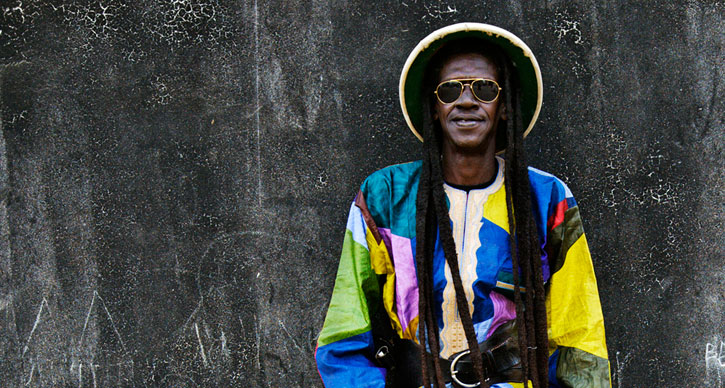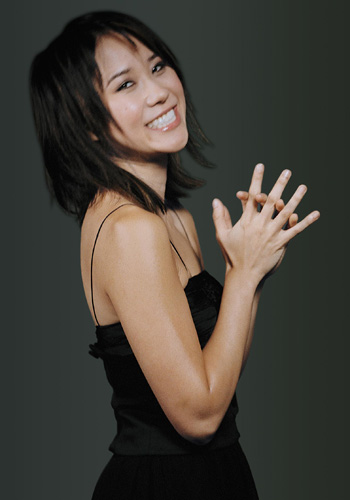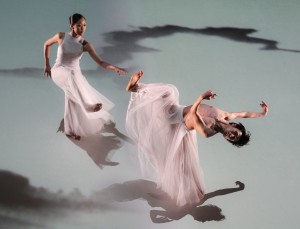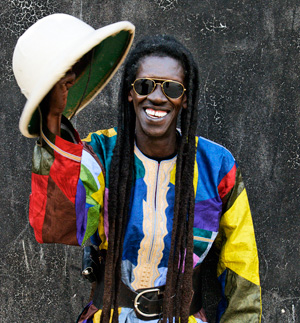Q&A with Cheikh Lô
 A superb singer and songwriter as well as a distinctive guitarist and drummer, Cheikh Lô blend of semi-acoustic flavors — West and Central African, funk, Cuban, flamenco — has been distilled into his most mature, focused, yet diverse statement today, his new album, Jamm. He performs at the Michigan Theater on April 13.
A superb singer and songwriter as well as a distinctive guitarist and drummer, Cheikh Lô blend of semi-acoustic flavors — West and Central African, funk, Cuban, flamenco — has been distilled into his most mature, focused, yet diverse statement today, his new album, Jamm. He performs at the Michigan Theater on April 13.
Jesse Hoffnung-Garskof is assistant professor of history, American culture, and Latina/o studies at the University of Michigan.
Jesse Hoffnung-Garskof: You now live in Senegal. But you are from Burkina Faso, which is a crossroads of many languages and cultures. What kinds of music did you hear in your house as a child?
Cheikh Lô: In my childhood, I heard all the music of Latin America and especially music from Cuba. This was music that came to West Africa. Congo and rumba were also heavily influenced by the music of West Africa. In the 70’s, I began to listen to pop music, soul, reggae, Jimmy Cliff, James Brown, and Michael Jackson, whom I remember seeing during his visit to Dakar in 1971.
JHG: On your latest album you sing a wonderful version of the song Seyni, which is a rumba. You even sing some of the lyrics in Spanish. I understand that this was the first song you ever sang in public. I think this may be surprising to audiences in Michigan. What was the importance of Cuban music for West African musicians of your generation?
Cheikh Lô: It was very important. We all started listening to that music and learned to play the chords on the guitar. It was a great reference for musicians of our generation. After Cuban music impacted us, it was music that had its origins in Africa and was created by Africans transported to America. The music of Cuba penetrated throughout West Africa and many musicians of my generation went to school there thanks to music scholarships.
JHG: You later moved to Dakar, one of the great musical capitals in Africa. There, you became known for your ability to blend the many popular musical traditions of the continent, especially Senegalese Mblax and Congolese Soukous. Please help our Michigan audience to understand these two styles.
Cheikh Lô: For me the combination of different styles has always been natural. From my beginnings in the first band I formed, there were musicians of all nationalities in Africa: Congo, Mali, and Burkina. Each sub-region of Africa has its specific characteristics. I have also spent time in hotels playing standards of Western music. The mixture of styles has always been natural in my career as an artist.
JHG: Of course, you have gone on to add other sounds as well. You toured with an all-star funk band led by Pewee Elis (who led James Brown’s band for years). He and Tony Allen (longtime drummer with Fela Kuti) appear on your new album. You also recorded in Bahia with Carlinhos Brown and Ile Aye. Can you tell us about your experiences collaborating with artists in the African diaspora?
Cheikh Lô: Being open to musical influences is very important and has always brought me many satisfactions. With Pewee, our long relationship has been extraordinary. He has worked in 3 of my 4 albums, and I hope our relationships continues to last over time. With Tony Allen, I remember when we met in 2004 at the concert “Black President.” I played the drums with Tony and another American drummer. The experience was incredible. Carlinhos Brown and I share a very similar vision of music, so collaborating is always fun.
JHG: Your lyrics are quite political. I think this might be lost on audiences in Michigan because most of us don’t understand Wolof, or Jula, or even French (although you would be amazed at how many Senegalese fans turned up when Baobab was here a few years ago). Can you explain the message of your songs Conia and Warico?
Cheikh Lô: For this I recommend reading the full transcriptions into French and English. They do a magnificent job of translation, and it’s well worth being read by the public in its entirety.
JHG: Speaking of politics, the last few years have seen a number of musicians move into political posts. Gilberto Gil was minister of culture in Brazil, Michel Martelly is now President of Haiti, Youssou N’Dour, who produced several of your albums, is running for President in Senegal. Barak Obama has been caught on film singing Al Green and B.B. King songs. Can we expect you to run for office?
Cheikh Lô: I do not think that I would devote myself to politics. It’s not my job. You have to be honest with yourself and know what your role is in life. Being a career politician is difficult and takes many years of work to be done well. I’ve worked with people in my community, not from a political standpoint but artistically. My mission will always be music. There is also corruption in politics, and I’m not willing to enter that world.
JHG: So what is next for Cheikh Lô?
Cheikh Lô: We want to have a big U.S. tour. Our group is trying to offer a wide range of music to American audiences with a show full of nuance and rhythm.
11/12 Asia & World Series
Asia
UMS focuses its global programming on four different regions of the world — the Arab World, Africa, the Americas, and Asia — with one region enjoying a particular focus during each season. Following the celebration of the performing arts of the Americas in the 10/11 season, UMS turns its thematic focus to Asia, specifically highlighting artists from China, Taiwan, Inner Mongolia, and India.
Subscription packages go on sale to the general public on Monday, May 9, and will be available through Friday, September 17. Current subscribers will receive renewal packets in early May and may renew their series upon receipt of the packet. Tickets to individual events will go on sale to the general public on Monday, August 22 (via www.ums.org) and Wednesday, August 24 (in person and by phone). Not sure if you’re on our mailing list? Click here to update your mailing address to be sure you’ll receive a brochure.
Yuja Wang, piano
Sunday, October 9, 4pm
Hill Auditorium
Twenty-four-year-old Chinese pianist Yuja Wang is widely recognized for playing that combines the spontaneity and fearless imagination of youth with the discipline and precision of a mature artist. She made her UMS debut in January 2008, just months after graduating from the Curtis Institute of Music, and since then has spent each year criss-crossing the globe with a cavalcade of impressive debuts and awards, including the prestigious Avery Fisher Career Grant, given to select musicians destined for bright solo careers.
Program
Ravel | Miroirs
Copland | Piano Variations
Rachmaninoff | Selected Preludes
Brahms | Sonata No. 1 or No. 3
Water Stains on the Wall
Cloud Gate Dance Theatre
Lin Hwai-min, artistic director
Friday, October 21, 8pm
Saturday, October 22, 8pm
Power Center
Trained in tai chi, meditation, Chinese opera movement, modern dance, and ballet, Cloud Gate Dance Theatre performs a rich repertoire with roots in Asian myths, folklore, and aesthetics, all infused with a contemporary perspective. For this long-awaited UMS debut, Cloud Gate presents Hwai-min’s newest work, Water Stains on the Wall. “Water stains on the wall” is a popular metaphor that represents the highest state in the aesthetics of Chinese calligraphy. Hwai-min and dancers take off from this metaphor and create and abstract work of beauty and magic that stands sublimely on its own.
AnDa Union from Inner Mongolia
Wednesday, November 9, 7:30pm
Michigan Theater
Formed in 2003, AnDa Union’s 14 members all hail from the Xilingol Grassland area of Inner Mongolia, a semi-autonomous region of China. AnDa Union are part of a musical movement that is finding inspiration in old and forgotten folk music from the nomadic herdsman cultures of Inner and Outer Mongolia, drawing on a repertoire of music that has all but disappeared during China’s recent tumultuous past. Its members are accomplished singers and instrumentalists, performing on the traditional horse-head fiddle (tsuur), the maodun chaoer, a three-holed flute, as well as Mongolian versions of the dulcimer, zither, lute, and mouth harp.
Beijing Guitar Duo with Manuel Barrueco
Sunday, November 20, 4 pm
Rackham Auditorium
Meng Su and Yameng Wang are widely noted for their outstanding technique and artistic musicality. They first met at the Central Conservatory in Beijing, where they began studying with the acclaimed professor Chen Zhi as children. Both women have won the Tokyo International Guitar Competition (Yameng Wang won it at age 12), and have received heaps of acclaim and recognition at international guitar events and from other seasoned guitarists, including Sergio Assad who has written and dedicated works to them. In 2008, they went to study with Manuel Barrueco at the Peabody Conservatory of Music in Baltimore and officially established themselves as the Beijing Guitar Duo. Both individually and together, their impressive talents come together to create one of the most excited guitar duos on the scene today.
Chamber Ensemble of the Shanghai Chinese Orchestra
Friday, February 10, 8pm
Rackham Auditorium
The 20 members of the Shanghai Traditional Chamber Ensemble are drawn from the first large-scale modern orchestra of traditional instruments in China. While Chinese stars such as Lang Lang have brought new attention to Western classical music in China, this ensemble provides a window into the traditional Chinese classical music that dates back centuries.
Zakir Hussain and the Master Musicians of India
Fazel Qureshi, tabla and kanjira
Rakesh Chaurasia, bansuri
Dilshad Khan, sarangi
Navin Sharma, dholak
Abbos Kosimov, doyra
Meitei Pung Cholom Performing Troupe (Dancing Drummers of Manipur)
Thursday, April 12, 7:30pm
Hill Auditorium
Zakir Hussain is today appreciated both in the field of percussion and in the music world at large as an international phenomenon. A classical tabla virtuoso of the highest order, his consistently brilliant and exciting performances have not only established him as a national treasure in his own country, but have earned him worldwide fame. For this return appearance, he performs with a host of Indian classical music greats, as well as the dancing drummers of Manipur.
Other World Music
In addition to the events from Asia listed above, UMS presents Goran Bregovic and His Wedding and Funeral Orchestra, which combines a Serbian Gypsy Band, string ensemble, orthodox male choir, and two Bulgarian female vocalists in a wild ride in Hill Auditorium; flamenco star Diego El Cigala; Max Raabe and Palast Orchester, recreating the high style and musical glory of the Weimar era; and Senegalese singer/songwriter Cheikh Lô.
Goran Bregovic & His Wedding and Funeral Orchestra
A Serbian Gypsy Band, Classical String Ensemble,
Orthodox Male Choir, and Two Bulgarian Female Vocalists
Saturday, October 15, 8 pm
Hill Auditorium
“It was party time…a Balkan free-for-all, and the jam-packed auditorium went wild…” (The Jerusalem Post) Balkan music icon and acclaimed film composer Goran Bregovic celebrates the music of Europe’s Gypsy tradition. With a 20-piece ensemble consisting of a Serbian gypsy band, a classical string ensemble, an all-male choir, two Bulgarian female singers and Bregovic’s own electric guitar, the music blends raucous gypsy dance tunes with traditional Eastern European choral music, spinning it all through a rock ‘n roll cycle.
Diego El Cigala
Saturday, November 5, 8 pm
Michigan Theater
Diego is a famous flamenco singer who started off by singing for well-known flamenco dancers but has since “moved to the front,” which in flamenco slang means to sing on one’s own instead of accompanying a dancer. He has collaborated with a variety of musicians, including Bebo Valdés, the Cuban pianist and bandleader with whom he recorded Lágrimas Negras, an album that created a sensation in Spain, becoming one of the best-selling albums in that country’s history and receiving a pile of awards, including five Latin Grammy nominations and the New York Times’ 2003 “Album of the Year” honors.
Berlin Nocturne
Max Raabe & His Palast Orchester
Saturday, March 10, 8pm
Hill Auditorium
“Max Raabe and his 12-piece Palast Orchester are re-creating the music of the Weimar era with verve and class.” (Time Out New York) A nostalgic homage to the legendary nocturnal flair of the Weimar Era, the debonair Max Raabe embodies the high style and music glory of the 1920s and 1930s, all backed by his stellar 12-member band. His art lies in revealing the enigmatic intelligence, ambiguity, musical power and complexity of the “German chansons” from the turbulent Weimar Republic — and then shaking it up with a completely unexpected cover from the contemporary pop realm.
Cheikh Lô
Friday, April 13, 8pm
Michigan Theater
Cheikh Lô is one of the great mavericks of African music. A superb singer and songwriter, as well as a distinctive guitarist, percussionist, and drummer, he has personalized and distilled a variety of influences from West and Central Africa to create a style that is uniquely his own. After emigrating to Paris and then returning to Senegal in the late 1980s, Lô attracted both the attention of and comparisons to Youssou N’Dour, who produced two of his early albums. His signature blend of semi-acoustic flavors — West and Central African, funk, Cuban, flamenco — has been distilled into his most mature, focused, yet diverse statement today, with his husky, sensual voice sounding better than ever.
Return to the complete chronological list.






